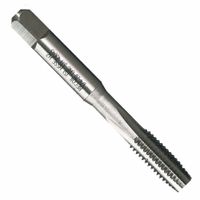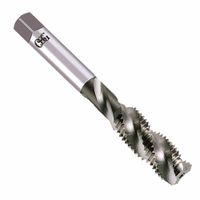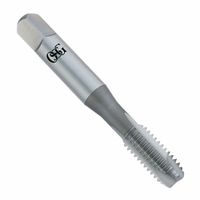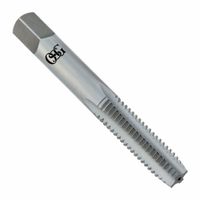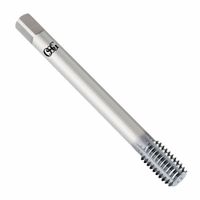Call +(254) 703 030 000 / 751 483 999 / 721 704 777
- Home
- Machining
- Threading
- Taps Internal Threading Tools
- Screw Thread Insert Sti Taps
.....Read More
Frequently Asked Questions
What is the purpose of a screw thread insert (STI) tap?
A screw thread insert (STI) tap is specifically designed to create threads in a hole that will accommodate a helical coil insert, such as a Helicoil. The primary purpose of an STI tap is to prepare a hole for the installation of these inserts, which are used to repair damaged threads or to reinforce threads in softer materials like aluminum or magnesium.
STI taps are slightly larger than standard taps because they need to create a thread that matches the outer diameter of the insert, rather than the bolt or screw that will eventually be used. This ensures that once the insert is installed, the internal threads of the insert match the original thread size and pitch of the fastener being used.
The use of STI taps and inserts provides several benefits:
1. **Thread Repair**: They allow for the repair of stripped or damaged threads, restoring the hole to its original size and function.
2. **Increased Strength**: Inserts can provide stronger threads in softer materials, distributing the load over a larger area and reducing the risk of thread stripping.
3. **Corrosion Resistance**: Inserts made from materials like stainless steel can offer improved corrosion resistance compared to the base material.
4. **Wear Resistance**: They can enhance the wear resistance of threads, especially in applications where frequent assembly and disassembly occur.
5. **Cost-Effectiveness**: Using inserts can be more economical than replacing entire components with damaged threads.
In summary, an STI tap is essential for creating the correct thread profile to accommodate a screw thread insert, ensuring a secure and durable fastening solution.
How do spiral-flute STI taps differ from straight-flute STI taps?
Spiral-flute STI (Screw Thread Insert) taps and straight-flute STI taps differ primarily in their design and application, which affects their performance in various materials and situations.
1. **Design**:
- **Spiral-Flute STI Taps**: These taps have helical grooves that resemble a spiral. The angle and direction of the spiral can vary, typically designed to efficiently remove chips from the hole being tapped.
- **Straight-Flute STI Taps**: These taps have straight grooves running parallel to the axis of the tap. They are simpler in design and are the traditional form of tap.
2. **Chip Removal**:
- **Spiral-Flute STI Taps**: The spiral design aids in lifting chips out of the hole, which is particularly beneficial in blind holes where chip evacuation is crucial to prevent clogging and potential damage.
- **Straight-Flute STI Taps**: These taps push chips ahead of the cutting action, which can be effective in through holes but may lead to clogging in blind holes.
3. **Material Suitability**:
- **Spiral-Flute STI Taps**: Ideal for softer, ductile materials like aluminum and copper, where chip evacuation is more challenging. They are also effective in materials that produce long, stringy chips.
- **Straight-Flute STI Taps**: Better suited for harder materials and those that produce short, brittle chips, such as cast iron.
4. **Application**:
- **Spiral-Flute STI Taps**: Preferred for applications requiring high precision and clean threads, especially in blind holes.
- **Straight-Flute STI Taps**: Commonly used for general-purpose tapping, especially in through holes.
5. **Performance**:
- **Spiral-Flute STI Taps**: Generally provide smoother cutting action and better finish due to efficient chip removal.
- **Straight-Flute STI Taps**: Offer robust performance in straightforward applications but may require more frequent clearing of chips in certain conditions.
What are the advantages of using thread-forming taps over cutting STI taps?
Thread-forming taps, also known as roll taps, offer several advantages over cutting STI (Screw Thread Insert) taps:
1. **Stronger Threads**: Thread-forming taps create threads by displacing material rather than cutting it, resulting in stronger, work-hardened threads with improved tensile strength and fatigue resistance.
2. **No Chip Production**: Since thread-forming taps do not cut material, they produce no chips. This eliminates chip-related issues such as clogging, which can lead to tap breakage or poor thread quality.
3. **Improved Surface Finish**: The threads produced by thread-forming taps typically have a smoother surface finish compared to those made by cutting taps, which can enhance the performance and longevity of the threaded connection.
4. **Longer Tool Life**: The absence of cutting action reduces wear on the tap, often resulting in a longer tool life compared to cutting taps. This can lead to cost savings in tool replacement and maintenance.
5. **Better for Certain Materials**: Thread-forming taps are particularly effective in ductile materials such as aluminum, copper, brass, and some plastics, where the material can be easily displaced without cracking.
6. **Reduced Torque Requirements**: The process of forming threads generally requires less torque than cutting, which can reduce the load on machinery and extend the life of equipment.
7. **Environmental Benefits**: With no chips to manage, thread-forming taps contribute to a cleaner work environment and reduce the need for chip disposal or recycling processes.
8. **Consistent Thread Quality**: The process tends to produce more consistent thread dimensions and quality, which is crucial for applications requiring precise tolerances.
These advantages make thread-forming taps a preferred choice in many manufacturing scenarios, especially where high-strength, high-quality threads are required without the complications of chip management.
How do spiral-point STI taps manage chip removal?
Spiral-point STI (Screw Thread Insert) taps, also known as gun taps, are designed to efficiently manage chip removal during the tapping process. These taps feature a spiral point at the cutting end, which is angled to direct chips forward, away from the cutting edges and out of the hole being tapped. This forward chip ejection is crucial for maintaining a clean cutting path and preventing chip clogging, which can lead to tap breakage or poor thread quality.
The spiral point design ensures that chips are pushed ahead of the tap, rather than being forced back into the flutes. This is particularly beneficial when tapping through holes, as it allows the chips to exit the hole entirely, reducing the risk of chip accumulation and ensuring smoother operation. The efficient chip removal also helps in maintaining the integrity of the threads being cut, as it minimizes the chances of chips being re-cut or causing damage to the newly formed threads.
Additionally, the spiral-point design reduces the amount of torque required during the tapping process, as the chips are continuously cleared from the cutting area. This reduction in torque not only extends the life of the tap but also enhances the overall efficiency and speed of the tapping operation.
In summary, spiral-point STI taps manage chip removal by directing chips forward through their angled cutting edges, ensuring efficient ejection from the hole, reducing the risk of clogging, and maintaining high-quality thread formation. This design is particularly advantageous for through-hole applications, where uninterrupted chip flow is essential for optimal performance.
What are the benefits of using helical-coil screw thread inserts?
Helical-coil screw thread inserts, often known as Heli-Coils, offer several benefits:
1. **Enhanced Thread Strength**: They distribute loads more evenly across the threads, reducing stress concentration and increasing the strength of the threaded connection.
2. **Wear Resistance**: Made from stainless steel, these inserts provide excellent resistance to wear and corrosion, extending the life of the threads.
3. **Repair and Maintenance**: They are ideal for repairing stripped or damaged threads, restoring them to a better-than-original condition without the need for oversized drilling.
4. **Vibration Resistance**: The spring-like design of the insert provides a locking action that resists loosening under vibration, making them suitable for dynamic applications.
5. **Material Compatibility**: Helical-coil inserts allow the use of stronger fasteners in softer materials, such as aluminum or magnesium, without damaging the parent material.
6. **Temperature Tolerance**: They can withstand a wide range of temperatures, making them suitable for applications in extreme environments.
7. **Cost-Effectiveness**: By preventing thread damage and reducing the need for frequent repairs, they offer long-term cost savings.
8. **Ease of Installation**: They are relatively easy to install with standard tools, reducing installation time and labor costs.
9. **Versatility**: Available in various sizes and materials, they can be used in a wide range of applications, from aerospace to automotive industries.
10. **Improved Load Distribution**: The insert's design ensures that the load is distributed over a larger area, reducing the risk of thread stripping.
Overall, helical-coil screw thread inserts enhance the durability, reliability, and performance of threaded connections in various applications.
How do pipe STI taps differ from standard STI taps?
Pipe STI (Screw Thread Insert) taps and standard STI taps differ primarily in their application and design. Pipe STI taps are specifically designed for creating threads that will accommodate screw thread inserts in pipe fittings, which often involve tapered threads to ensure a tight seal. These taps are used in applications where fluid or gas tightness is critical, such as in plumbing or hydraulic systems.
On the other hand, standard STI taps are used for creating threads in holes that will receive screw thread inserts in general applications, typically involving straight threads. These are used to repair or reinforce threads in softer materials like aluminum or magnesium, or to create durable threads in new assemblies.
The key differences include:
1. **Thread Type**: Pipe STI taps create tapered threads, while standard STI taps create straight threads.
2. **Application**: Pipe STI taps are used for fluid or gas-tight applications, whereas standard STI taps are used for general mechanical applications.
3. **Design**: Pipe STI taps have a taper to match the taper of pipe threads, while standard STI taps have a consistent diameter.
4. **Material Compatibility**: Both types are used in softer materials, but pipe STI taps are specifically for applications requiring a seal.
In summary, the main distinction lies in the thread type and application, with pipe STI taps being specialized for sealing applications in piping systems, while standard STI taps are used for general thread repair and reinforcement.
What materials are suitable for use with STI taps?
STI (Screw Thread Insert) taps are designed for creating threads that will accommodate helical coil inserts, commonly known as Heli-Coils. These taps are used to repair stripped threads or to create new threads in softer materials. The materials suitable for use with STI taps include:
1. **Aluminum**: Due to its softness and lightweight properties, aluminum is often used in automotive and aerospace applications. STI taps are ideal for creating durable threads in aluminum components.
2. **Magnesium**: Similar to aluminum, magnesium is lightweight and used in applications where weight reduction is critical. STI taps help reinforce threads in magnesium parts.
3. **Brass**: Known for its corrosion resistance and machinability, brass is used in plumbing and electrical applications. STI taps can create strong threads in brass components.
4. **Copper**: With excellent thermal and electrical conductivity, copper is used in electrical and plumbing systems. STI taps are suitable for threading copper to ensure secure connections.
5. **Plastics**: Various plastics, including nylon and polycarbonate, are used in manufacturing due to their versatility and cost-effectiveness. STI taps can be used to create robust threads in plastic parts.
6. **Cast Iron**: Although harder than the materials listed above, cast iron can still benefit from STI taps, especially in applications requiring reinforced threads.
7. **Mild Steel**: While not as soft as aluminum or brass, mild steel can be tapped with STI taps to create threads that accommodate inserts for added strength.
STI taps are generally not recommended for extremely hard materials like hardened steel or titanium, as these materials can cause excessive wear on the taps and may not provide the necessary thread integrity for inserts.
